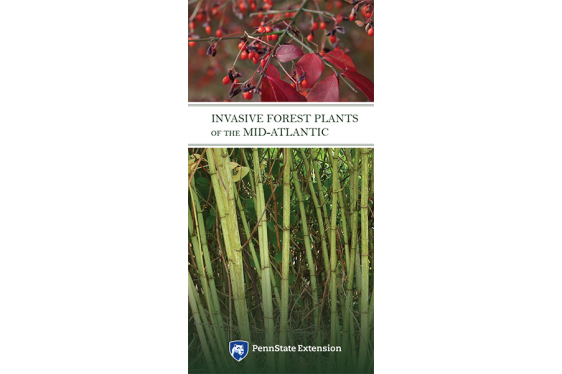Posted: January 11, 2018
This 72-page, full-color guide provides in-depth practical information to help landowners and natural resource professionals identify and treat invasive plants often found in fields, forests, and woodlots.
Penn State Extension has released a new invasive plant identification and control guide book entitled Invasive Forest Plants of the Mid-Atlantic. The guide was prepared by Penn State Forest Biology undergraduate student Sky Templeton, with editorial comments provided by Jim Finley, Penn State Department of Ecosystem Science and Management, Norris Muth, Juniata College Professor of Biology, David Jackson, Penn State Forest Resources Educator, and Allyson Muth, Penn State Center for Private Forests.
The term "invasive" is used to describe a plant which grows rapidly, spreads aggressively, and displaces other native plants. It is typically non-native to the area, but has naturalized in such a way as to hinder or negatively affect the ecosystem it currently inhabits. Invasive plants degrade native environments by causing a decline in native plant species diversity. They diminish wildlife habitats for native insects, birds, and animals and threaten rare species. In addition, invasive plants have been shown to inhibit forest regeneration success and slow natural succession. Once established, invasive plants require large amounts of time, labor, and money to control or eliminate.
This 72-page, full-color guide provides in-depth practical information to help landowners and natural resource professionals identify and treat invasive plants often found in fields, forests, and woodlots. It describes 25 of the most common invasive plants found in the Mid-Atlantic region, including grasses, herbs, shrubs, trees, and vines.
Introductory methods of treatment and a general treatment calendar are provided at the beginning of each chapter. Templeton states, "It is our hope that once invasive plants are identified, landowners will be better equipped to implement control measures and seek additional treatment information." The guide also includes a glossary and resources section where you can go for additional information.
Check it out; you are sure to find at least a handful of these invaders across your lands, and they may be species you never considered to be invasive.
The guide is available for $10 and can be purchased online at the Penn State Extension website or by calling 877-345-0691.
Please note, the guide is only available in hardcopy and there is a $14 shipping and handling fee on orders.
James C. Finley Center for Private Forests
Address
416 Forest Resources BuildingUniversity Park, PA 16802
- Email PrivateForests@psu.edu
- Office 814-863-0401
- Fax 814-865-6275
James C. Finley Center for Private Forests
Address
416 Forest Resources BuildingUniversity Park, PA 16802
- Email PrivateForests@psu.edu
- Office 814-863-0401
- Fax 814-865-6275


